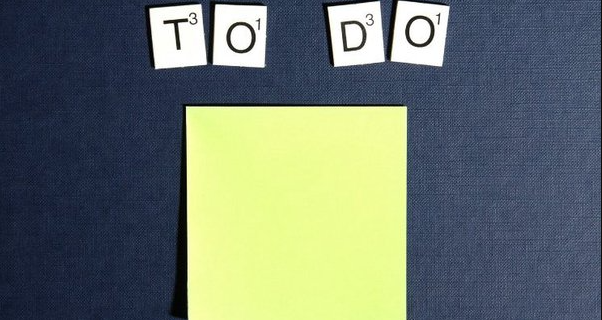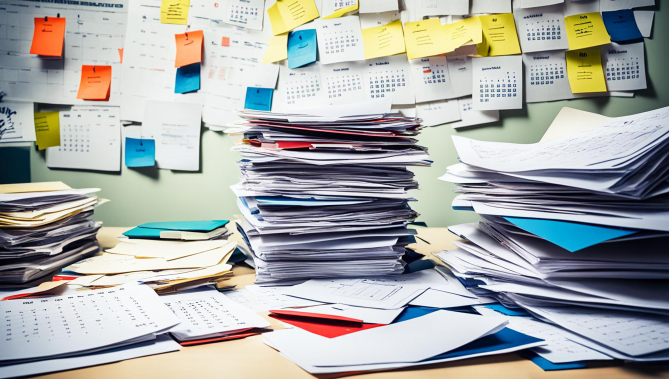Understanding how to manage time well is key for a successful day at work. But many professionals struggle with this. They often don’t make to-do lists or plan their week properly. This makes it easy for them to get off track. They end up spending too much time on social media, answering emails, or with interruptions from coworkers.
Not scheduling things well leads to canceled meetings and wasted time. Multitasking might seem like a good idea, but it usually means jobs don’t get finished properly. Setting clear goals and managing yourself well are crucial. These help you stay on task and complete your work.
Trying to do too much can make you feel overwhelmed and less efficient. It’s important to know the difference between being busy and being productive. Choosing the most important tasks, setting up a good schedule, and taking breaks can help. This will make your workdays more effective and less stressful.
Lack of a To-Do List
In today’s world, a plan is key for a focused day. Without a to-do list, you face many distractions. These can come from friends, social media, and emails. A solid to-do list can keep these at bay.
Consequences of Not Having a To-Do List
Not having a list can make you forget important tasks. It might also make you feel like there’s too much to do. Without clear tasks, your work can lose meaning.
Letting distractions in can hurt your focus. You might try to do many things at once. This could make mistakes more likely. Missing deadlines may start happening often. This is because you might not plan your time well. Having a bad schedule can keep you from reaching important goals.
How to Create an Effective To-Do List
It’s important to set clear daily goals. Your to-do list should focus on what’s most important. It should also leave room for rest.
Try to manage your time well. Use methods like the Pomodoro method. This is working for a short time, then taking a break. Adjust and look over your list often. This keeps you on track. This way, you work efficiently, not just hard. You can avoid putting things off and be more productive.
No Weekly Planning
Without weekly planning, it’s hard to manage time well. A good week relies on choosing what to do first and using time wisely. Sadly, 72% of people don’t plan their week, which can lead to mess-ups and late work. When you plan your week right, you put the most important things first when you’re at your best, making things work better.
Importance of Weekly Planning
Weekly planning is key in time management. It lets you put the big tasks first and leaves the less important stuff later. Studies say planning ahead makes it half as likely to miss something really important. And people who set goals each day do their job better, according to the American Psychological Association. Planning also helps mix work and fun, getting a well-spent week.
Steps to Plan Your Week Efficiently
Here’s how to plan your week right:
- Use a Calendar: Mark every task, even breaks, to see where time goes. This helps handle time limits better.
- Chop Big Jobs: Make big tasks smaller over your calendar. This cuts down on waiting and boosts your focus.
- Plan for Surprises: Set aside time for the unexpected.
- Pick What Matters: Use tools like Stephen Covey’s matrix to know what to do first.
- Look Back: Each week, see what went well and what to change for next time.
- See it Happen: Picture your day and week in your head to get ready for them.
- Automate and Share: Use tech for stuff that comes up a lot and share tasks when you can. This saves time and stress.
By sticking to these rules, you’ll have a better week. You’ll manage your time well and do what’s most important to reach your goals. Good luck!
Ineffective Scheduling
Bad scheduling stops businesses from working well. It is seen as a big time waster for many. It leads to missed deadlines and wasted time. We’ll dive into what goes wrong with scheduling and how to fix it.
Common Scheduling Pitfalls
Not setting useful reminders is a big problem. This can lead to missing important meetings or appointments. It’s key to use tools that remind you on time. Don’t take on too much work without knowing how much time you actually have. This can really mess up your schedule.
Putting off tasks, trying to do too many things at once, and wanting everything to be perfect are bad habits. They make it hard to get stuff done right and on time. This can make you look bad at work. People might think you’re not good at managing your time.
Tips for Effective Scheduling
Use reminders to keep track of your meetings. This helps a lot. Make sure your scheduling tools are easy to use. This makes things smooth for everyone. Also, always match the right people with the right clients. This avoids delays and upsets.
It’s important to know how you work best. Set aside time for tasks that are really important. Don’t overlook how much time they might take. And take breaks to stay fresh. Working without stopping can make you tired and find it harder to manage your time well.
Set clear goals and watch how you spend your time. This can really make your scheduling better. By balancing your day and focusing on what really needs to get done, you waste less time and do more work.
The Myth of Multitasking
Many think handling many things together shows they’re efficient. But, it’s not true. Multitasking makes jobs half-done, more stress, and worse results. Studies show that switching between tasks takes a toll on our brains. Hewlett-Packard sponsored research found that people distracted by emails and calls saw more IQ drops than weed smokers. Jonathan B. Spira stated that multitasking costs the U.S. economy about $650 billion in a year.
Why Multitasking Reduces Efficiency
Jumping between tasks doesn’t help us do more. It actually makes us take longer to finish things. Imagine at work, you stop to check a message. It takes around 25 minutes to get back on track after. Plus, most people don’t multitask well and make about 50% more mistakes.
Alternatives to Multitasking
Focus on one job at a time to get more done well. Doing tasks one after the other can be up to 40% faster. Trying to do too much at once doesn’t work. Use the 20-minute rule. Work on one thing for 20 minutes straight with no distractions. It’ll help you do the job better and faster.
Guesswork in Task Management
Being good at task management helps keep us all working well. But when we guess about what to do, it can make things hard. This can mean we do things over and over, wasting our time and stuff.
How Guesswork Leads to Wasted Time
Guessing can mess up our plans, making us fix mistakes later. We usually only find these mistakes when someone is upset. Knowing why mistakes happen helps us see how they hurt our project plans.
It’s important to spot problems early, especially if they’re big or important to our best customers. This saves us from doing things again and again. Fixing the most important issues first can stop a lot of extra work.
Strategies to Avoid Guesswork
We can avoid guessing by making our plans and tasks very clear. Everyone needs to understand what to do. Good talk helps us see who’s good at doing what, making work easier.
Using special software can also help. It reminds us of deadlines and ways to work better together. This makes everything smoother, leaving less space for mistakes. Improving how we work by managing time better means we don’t have to fix a lot of things later.
By using these methods, we can make our projects clearer and our team happier. Learning good task management skills makes our work go well and feel good.
Dealing with Distractions
It’s tough to stay focused at work with so many things around us. To work better, it’s key to know and cut down these distractions.
Common Workplace Distractions
Things like loud ringtones, messages popping up, and chatting with coworkers make us lose focus. Etiquette expert Anna Musson says this can make us look bad at work. People might not want to work with us if we seem like we don’t value their time. A lot of our own time can also go to waste because of these bad habits.
It gets even worse if we let these distractions control us. This can lead to burnout. Burnout makes us feel tired, stressed, and do bad at our jobs. It’s a vicious cycle that starts with not managing our time well.
Techniques to Minimize Distractions
There are many ways to reduce distractions and boost focus. First, stop all those notifications that are not important. Then, set aside time where no one should disturb you. This helps you work better and shows you respect your work.
Using a stopwatch or an app can help you keep track of your time better. It can make you more aware of how long things really take. Also, limit how much you socialize during work hours. Focus on what needs to get done first. The Eisenhower matrix can be a big help here. It sorts tasks by their urgency and importance.
By following these methods, you can concentrate better and get more done. They make your work days more productive. And that, in turn, improves your work life as a whole.
Overcommitting and Doing Too Much
Overcommitting is a big issue. It causes a lot of stress and makes us less effective. Many workers take on too much without thinking of their personal limits. They then show signs of overwork, such as forgetting important tasks, making math mistakes, or skipping meals. When these signs show up, it’s time to rethink how we handle our workload.
It’s key to know your limits and set doable deadlines for tasks. Working too hard makes us tired and prone to more mistakes, like spelling errors. This is a sign of burnout. Being overloaded not only hurts how much we get done, but also slices into our personal time. This can mean less time for family, friends, and hobbies.
Delegating tasks is a great way to deal with doing too much. It spreads the work out evenly and ensures work gets finished well. Delegating can help stop the cycle of working more but accomplishing less. Giving up sleep just to work more makes things worse. It leads to less productivity and concentration.
Handling lots of tasks at once might seem smart. But, it often leads to more stress and lower job quality. About 68% of solopreneurs and small business owners struggle because they don’t schedule or automate tasks. To fight burnout, it’s important to notice warning signs early and take action. Being tired can make tasks take longer, which then raises stress and lowers productivity.
Managing workload also means knowing when to turn down work. Over 60% of workers say they take on too much, leading to bad time management. To not fall into this trap, it’s crucial to focus on the most important tasks and hand over some to others. This keeps work balanced and helps keep a manageable and healthy pace, thus preventing burnout.
Skipping Breaks and Burnout
Many skip breaks at work, thinking it’ll make them more productive. But it actually leads to burnout and less work done. Not taking time to rest can harm both mental and physical health.
The Importance of Taking Breaks
Short breaks fight off tiredness and help you be more creative. Our brains need time to rest to keep working well. Without pauses, people become easily tired, lose focus, and creativity fades.
How to Integrate Breaks into Your Schedule
Adding breaks smartly can make us work better. Try the Pomodoro Technique: work hard for 25 minutes, then take a 5-minute break. Taking short breaks or changing your work view can refresh you for better focus.
When companies encourage taking breaks, they help their workers stay healthy and productive. It’s important for everyone’s well-being.
Poor Self-Management
Good self-management is key for being productive working from home. It keeps you on track and tasks don’t fall by the wayside. Having a set routine and work hours is crucial. This makes sure your day runs smoothly and that you get things done.
Creating a work area free from distractions is vital. It boosts your focus and what you get done. Working from home makes it hard to focus without a special spot, causing more distractions.
Self-discipline is very important too. Sticking to a schedule and task list takes commitment. Otherwise, you might put things off and get stressed. Self-discipline keeps you on track and helps you finish on time.
It’s also key to hold yourself accountable. When you do, you’re in charge of what you do and the results. Without proper planning, you might miss deadlines and work inefficiently. Reflecting on your work helps you avoid the same mistakes and get better over time.
Remember to take regular breaks to avoid feeling worn out. Too much work without breaks can make you tired and less productive. Taking short breaks during the day can refresh you.
It’s also important to be flexible and communicate well when schedules change suddenly. To meet deadlines, you must organize tasks and your team effectively. Make sure to focus on what’s most important and share lesser tasks to keep productive and less stressed.
Many who work remotely struggle with managing their time. But, with structured routines, clear workspaces, self-discipline, and accountability, you can boost your productivity when working from home.
Conclusion
Being good with your time is very important. Do you know the saying, “Remember that time is money?” Benjamin Franklin said this in 1748. It’s still true today. We need to use our time well. This means not ignoring tasks, having a good plan, and not trying to do too much at once.
If we don’t manage our time right, bad things can happen. We might feel overwhelmed, do less well at our jobs, and have trouble with friends and family. Maura Thomas points out that it’s easy to get distracted today. We need to be smart about setting goals and limits to keep focus. That way, we can enjoy work and life more.
Not using time well can hurt companies too, not just us. Businesses in the U.S. lose a lot of money because of this and because workers leave. How to fix this? Have good talks with your team and use time wisely. Focus on important things and stay away from common time traps. This will help everyone do better and be happier at work.
FAQ
What are the common time management mistakes people often make?
Many folks forget to make a to-do list. They also don’t plan their week well. They try to do too much at once and don’t handle tasks wisely. Distractions are a big problem, and they often take on too much work.
What are the consequences of not having a to-do list?
Not having a to-do list makes it easy to get off track. Things like social media, emails, and people at work can waste your time. With no plan, your day can quickly spin out of control.
How can I create an effective to-do list?
Make sure your list has clear tasks and goals with deadlines. This prevents you from putting things off. It also helps you stay focused on what really matters.
Why is weekly planning important?
Planning your week helps use your time well. It lets you decide what’s important. This way, you can focus on the things that need to be done sooner.
How can I plan my week efficiently?
Know when you work best and use tools like the Action Priority Matrix or Google Keep. Set aside your best times for important tasks.
What are common scheduling pitfalls?
People often forget about meetings or find them hard to move. They also sometimes use schedules that are too complicated. Remembering things and keeping it simple is key to good scheduling.
What are tips for effective scheduling?
Figure out when you’re most productive. Don’t forget to include enough time for tasks. Use reminders and a simple schedule to stay on track.
Why does multitasking reduce efficiency?
Multitasking makes it hard to finish tasks. It slows you down and can lead to mistakes. It also limits how creative and accurate you can be.
What are alternatives to multitasking?
Try breaking work into smaller parts and complete them one by one. Save multitasking only for things that won’t suffer from it. Staying focused on one task at a time is best.
How does guesswork in task management lead to wasted time?
Guessing can make a team do things wrong the first time. This means they might have to do it again. Clear instructions and understanding are the best fixes.
What strategies can I use to avoid guesswork?
Have a detailed plan and match tasks to your team’s skills. Make sure everyone knows what they should do. This keeps the work smooth and avoids fixing things later.
What are common workplace distractions?
Noises, phone alerts, and talking with others can break your focus. They stop you from working well.
How can I minimize distractions at work?
Turn off alerts that aren’t needed. Find times to work without interruptions. Setting boundaries helps keep you focused and respected by others.
Why can overcommitting be detrimental?
Too much to do causes stress and can make you less effective. It can feel like too much, making it hard to get much done at all.
How can I prevent overcommitting?
Know your limits and set deadlines you can meet. Give some work to others if you can. This keeps your workload manageable and you in good shape.
Why are regular breaks essential for productivity?
Breaks keep you from getting too tired and make you more productive over time. They refresh your mind to keep going strong.
How can I integrate breaks into my schedule?
Try using the Pomodoro Technique or just step away for a bit. This helps you come back ready to work again.
What is the importance of self-management in remote work?
Being able to manage yourself is crucial when you work away from the office. It means sticking to a routine, choosing your work times, and making a space just for work.

More Posts
7 Best Digital Personal Planners for Every Budget
Managing our everyday tasks, meetings, and goals has become increasingly difficult in the digital age. Fortunately, multiple budget digital planner apps help you stay organized and productive. Whether you prefer the simplicity of...
7 Best Online Meal Planners (Free & Paid)
Do you find yourself constantly struggling to come up with healthy meal ideas that fit your busy lifestyle? Meal planning doesn’t have to be a daunting task - countless online meal planners can...
Effective Time Management Exercises For Improved Productivity
Productivity is not something that comes with being busy. There is a common misconception that increasing the number of hours will enhance productivity. But that’s not true! Productivity has nothing to do with...
Top 9 Facts About Time Mastery
Effective time management is key for being productive and keeping a good balance. Over 80% of those who are good at managing their time feel much less stressed. This way of working not...




